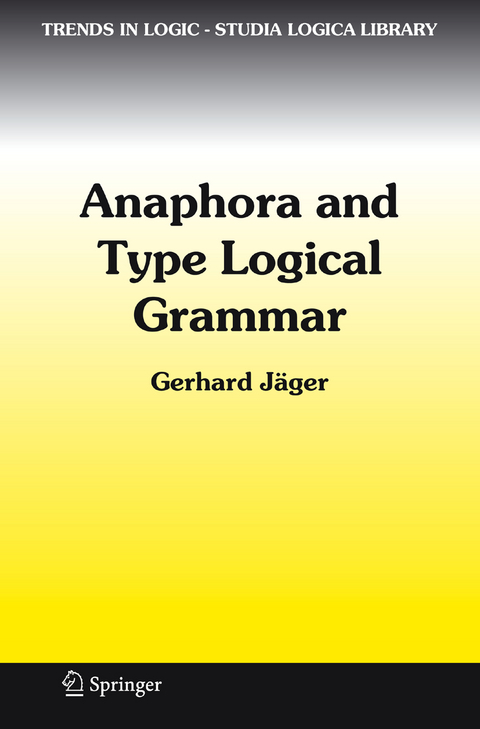
Anaphora and Type Logical Grammar
Springer-Verlag New York Inc.
978-1-4020-3904-1 (ISBN)
ThisbookdiscusseshowTypeLogicalGrammarcanbemodi?edinsuch awaythatasystematictreatmentofanaphoraphenomenabecomesp- sible without giving up the general architecture of this framework. By Type Logical Grammar, I mean the version of Categorial Grammar that arose out of the work of Lambek, 1958 and Lambek, 1961. There Ca- gorial types are analyzed as formulae of a logical calculus. In particular, the Categorial slashes are interpreted as forms of constructive impli- tion in the sense of Intuitionistic Logic. Such a theory of grammar is per se attractive for a formal linguist who is interested in the interplay between formal logic and the structure of language. What makes L- bekstyleCategorialGrammarevenmoreexcitingisthefactthat(asvan Benthem,1983pointsout)theCurry-Howardcorrespondence-acentral part of mathematical proof theory which establishes a deep connection betweenconstructivelogicsandthe?-calculus-suppliesthetypelogical syntax with an extremely elegant and independently motivated interface to model-theoretic semantics. Prima facie, anaphora does not ?t very well into the Categorial picture of the syntax-semantics interface.
The Curry-Howard based composition of meaning operates in a local way, and meaning ass- bly is linear, i.e., every piece of lexical meaning is used exactly once. Anaphora, on the other hand, is in principle unbounded, and it involves by de?nition the multiple use of certain semantic resources. The latter problem has been tackled by several Categorial grammarians by ass- ing su?ciently complex lexical meanings for anaphoric expressions, but the locality problem is not easy to solve in a purely lexical way.
List of Tables. Preface. Acknowledgments. Type Logical Grammar: The Framework. Basic Categorial Grammar. Combinators and Type Logical Grammar. Historical and bibliographical remarks.- The Problem of Anaphora. Anaphora and semantic resource sensitivity. Variables in TLG. Previous Categorial approaches to anaphora. Summary.- Lambek Calculus with Limited Contraction. The agenda. Contraction? The Logic LLC. Relation to Jacobson's system.- Pronouns and Quantification. Basic cases. Binding by wh-operators. Binding by quantifiers. Weak crossover. Precedence versus c-command. Backward binding and reconstruction.- Verb Phrase Ellipsis. Introduction. VPE: The basic idea. Interaction with pronominal anaphora. Interaction of VPE and quantification. VPE and Polymorphism. Parallelism versus source ambiguity.- Indefinites. Introduction. Dekker's Predicate Logic with Anaphora. ringing PLA into TLG. Donkey sentences. Indefinites and scope. Sluicing. Summary and desiderata.- References. Index.
| Erscheint lt. Verlag | 26.8.2005 |
|---|---|
| Reihe/Serie | Trends in Logic ; 24 |
| Zusatzinfo | XIV, 290 p. |
| Verlagsort | New York, NY |
| Sprache | englisch |
| Maße | 155 x 235 mm |
| Themenwelt | Geisteswissenschaften ► Philosophie ► Logik |
| Geisteswissenschaften ► Sprach- / Literaturwissenschaft ► Sprachwissenschaft | |
| ISBN-10 | 1-4020-3904-2 / 1402039042 |
| ISBN-13 | 978-1-4020-3904-1 / 9781402039041 |
| Zustand | Neuware |
| Haben Sie eine Frage zum Produkt? |
aus dem Bereich


